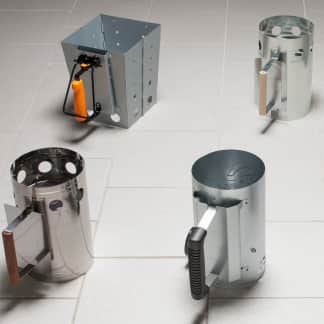Charcoal fire starters—flammable tiles, cubes, or nuggets—are advertised as waterproof alternatives to the newspaper used for lighting charcoal briquettes in a chimney starter. To see how well they worked, we bought five fire starters (made from materials like wax, wood chips, volcanic rock, and paper), and used the lowest number of units recommended by the manufacturers (from one to three) to light chimneys filled with charcoal briquettes. Then we grilled zucchini and flank steak over the coals and tasted each food for off-flavors.
All five starters did a good job of lighting the charcoal, taking about the same time as four sheets of newspaper to heat the charcoal for cooking, and they imparted no off-flavors to the food. To test how waterproof they were, we submerged the starters in water for 2 hours and then tried to light them; while none would light straight out of their bath, all ignited without much trouble after we blotted them dry with paper towels.

Differences were minor; some of the starters ignited more quickly than others, and some made slightly more of a mess in the bottom of the grill basin, but they all worked. Our take? If you don’t keep newspaper around, any of the fire starters make fine substitutes. They may even be preferable if you grill in inclement weather. A bonus: You can use these starters to light a wood fire or, in a pinch, to light charcoal without a chimney (you’ll need to move the charcoal around a bit to get it evenly lit).
Our favorite charcoal fire starters, the Weber Lighter Cubes, took less than 10 seconds to light. Made entirely of paraffin wax, they were easy to clean up afterward and were the most water-resistant of the bunch.
The Tests:
- Light chimney starters filled with briquettes, using the lowest number of units recommended by each manufacturer and timing how long it takes for the starters to ignite and the coals to be ready for cooking
- Grill flank steak over each bed of coals and taste for off-flavors
- Grill zucchini over each bed of coals and taste for off-flavors
- Soak starters in water for 2 hours and then try to light
- Soak starters in water for 2 hours and then blot dry and light, timing how long it takes for the coals to be ready for cooking
- Evaluate the mess each starter leaves in the grill after use
How We Rated:
- Ease of Ignition: We placed the fewest number of units recommended by the manufacturer (from one to three) on the lower grate of a charcoal grill and positioned a charcoal chimney filled with briquettes over it. We lit each starter (or set of starters) with a match and timed how long it took the starters to fully ignite and the coals to be ready for cooking. Fire starters that ignited quickly—in less than 10 seconds—scored highly.
- Clean Flavors We grilled zucchini planks and flank steak over the coals ignited by each of the starters and had a panel of test cooks and editors taste each food. Our panel did not detect off-flavors from any of the starters, so no points were deducted.
- Cleanup: While grilling over charcoal is already a somewhat messy undertaking, we subtracted points for starters that contributed significantly to the cleanup process or produced higher amounts of wind-borne ash.
- Water Resistance: No starter ignited directly out of a 2-hour soak in water, but all ignited after we quickly blotted them dry with paper towels. Some starters seemed to absorb more water and took slightly longer to dry and light, and thus were demoted slightly.
- Lights quickly and easily when dry
- Lights relatively quickly after soaking and blotting dry
- Requires minimal cleanup













